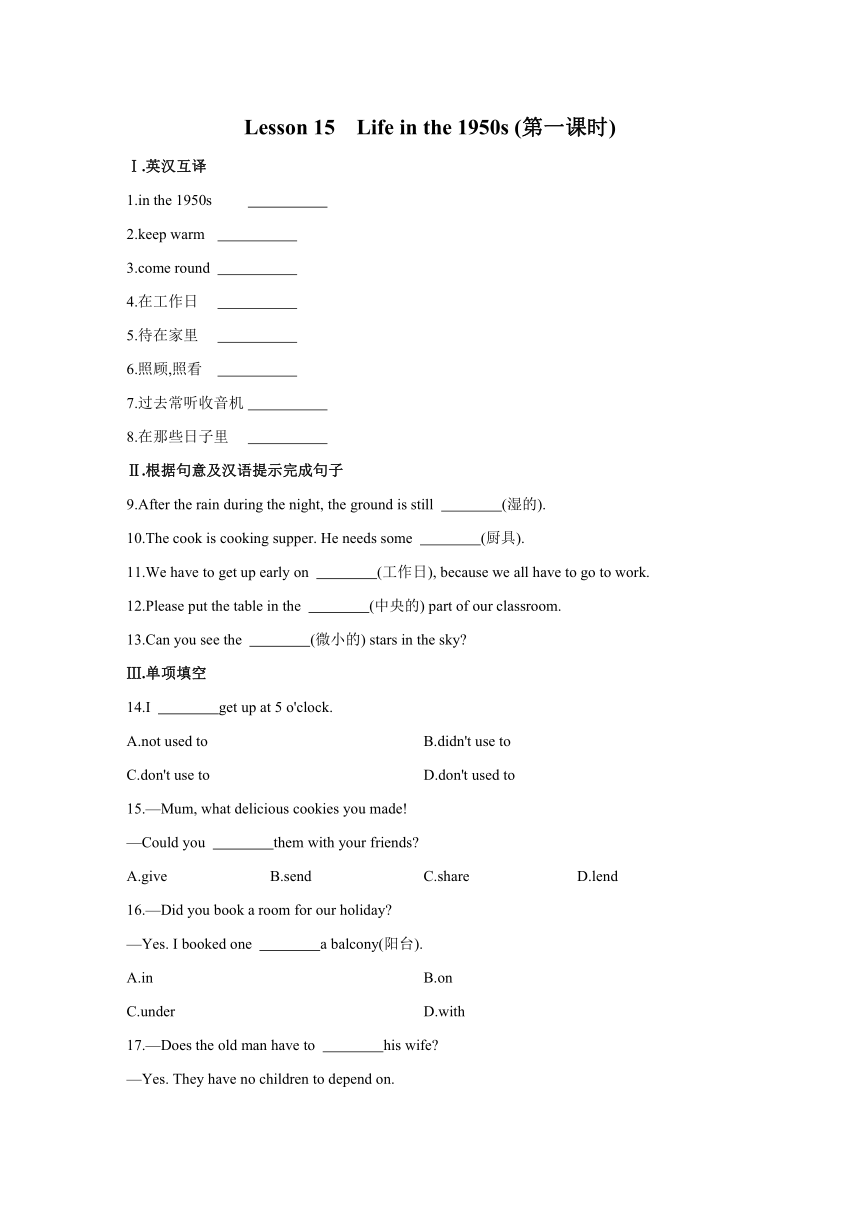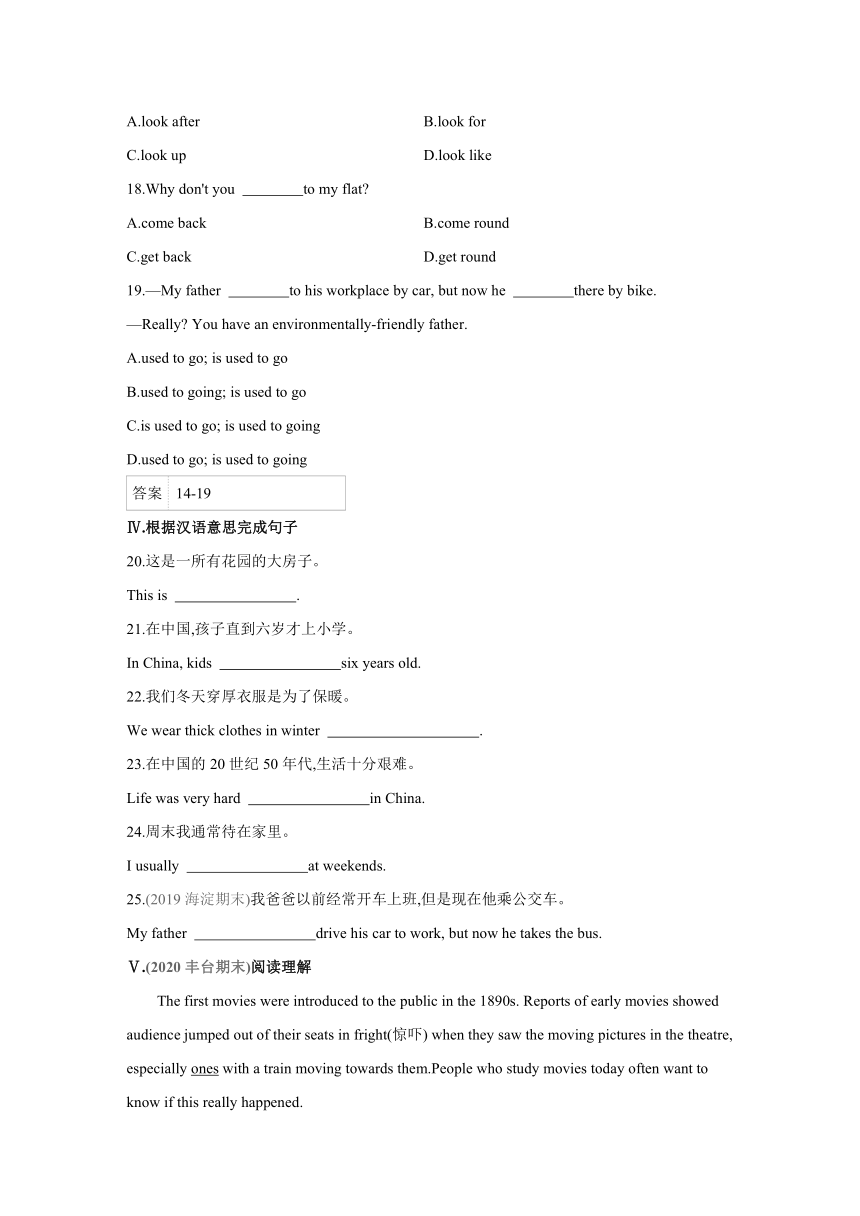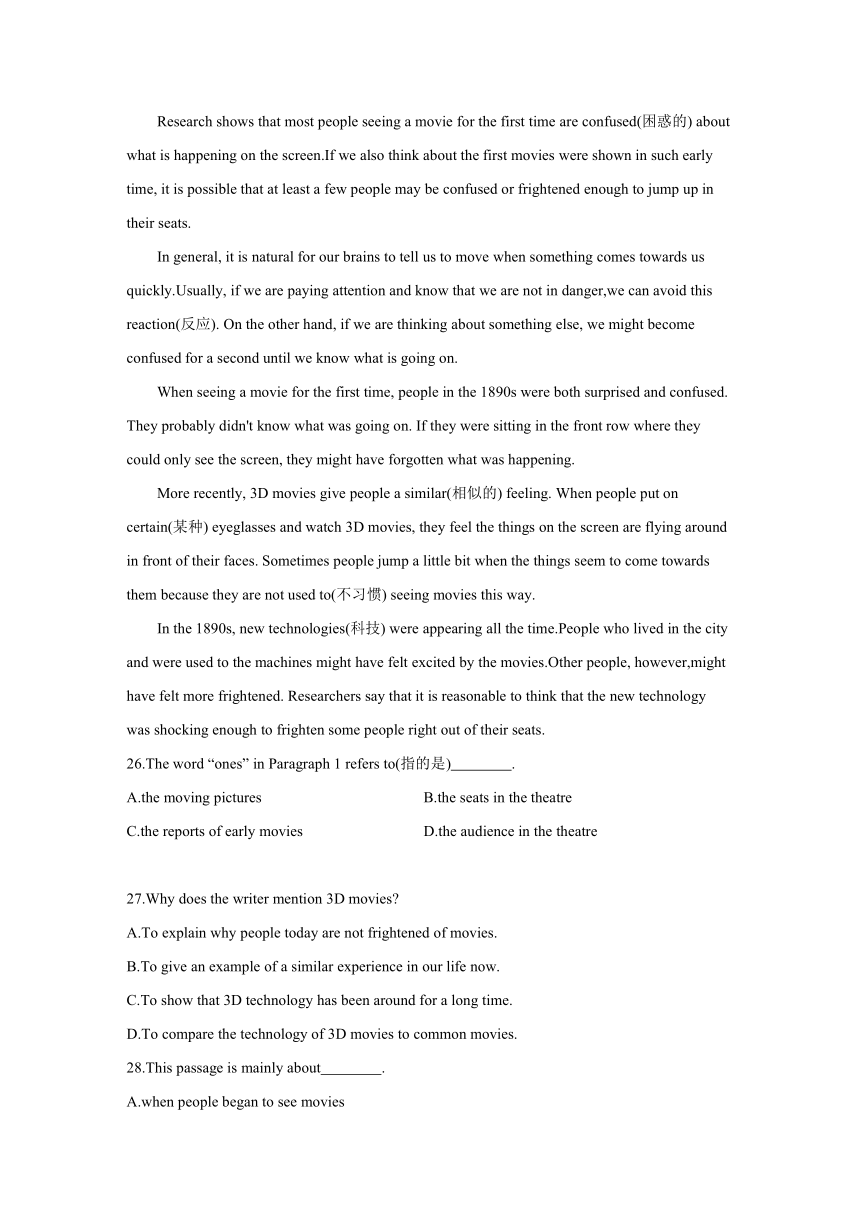Unit 5 Memories Lesson 15 Life in the 1950s 同步课时作业 (第一课时)(word版,含答案)
文档属性
| 名称 | Unit 5 Memories Lesson 15 Life in the 1950s 同步课时作业 (第一课时)(word版,含答案) |  | |
| 格式 | docx | ||
| 文件大小 | 30.0KB | ||
| 资源类型 | 教案 | ||
| 版本资源 | 北师大版 | ||
| 科目 | 英语 | ||
| 更新时间 | 2022-04-04 10:37:38 | ||
图片预览



文档简介
数学
化学
Lesson 15 Life in the 1950s (第一课时)
Ⅰ.英汉互译
1.in the 1950s
2.keep warm
3.come round
4.在工作日
5.待在家里
6.照顾,照看
7.过去常听收音机
8.在那些日子里
Ⅱ.根据句意及汉语提示完成句子
9.After the rain during the night, the ground is still (湿的).
10.The cook is cooking supper. He needs some (厨具).
11.We have to get up early on (工作日), because we all have to go to work.
12.Please put the table in the (中央的) part of our classroom.
13.Can you see the (微小的) stars in the sky
Ⅲ.单项填空
14.I get up at 5 o'clock.
A.not used to B.didn't use to
C.don't use to D.don't used to
15.—Mum, what delicious cookies you made!
—Could you them with your friends
A.give B.send C.share D.lend
16.—Did you book a room for our holiday
—Yes. I booked one a balcony(阳台).
A.in B.on
C.under D.with
17.—Does the old man have to his wife
—Yes. They have no children to depend on.
A.look after B.look for
C.look up D.look like
18.Why don't you to my flat
A.come back B.come round
C.get back D.get round
19.—My father to his workplace by car, but now he there by bike.
—Really You have an environmentally-friendly father.
A.used to go; is used to go
B.used to going; is used to go
C.is used to go; is used to going
D.used to go; is used to going
答案 14-19
Ⅳ.根据汉语意思完成句子
20.这是一所有花园的大房子。
This is .
21.在中国,孩子直到六岁才上小学。
In China, kids six years old.
22.我们冬天穿厚衣服是为了保暖。
We wear thick clothes in winter .
23.在中国的20世纪50年代,生活十分艰难。
Life was very hard in China.
24.周末我通常待在家里。
I usually at weekends.
25.(2019海淀期末)我爸爸以前经常开车上班,但是现在他乘公交车。
My father drive his car to work, but now he takes the bus.
Ⅴ.(2020丰台期末)阅读理解
The first movies were introduced to the public in the 1890s. Reports of early movies showed audience jumped out of their seats in fright(惊吓) when they saw the moving pictures in the theatre, especially ones with a train moving towards them.People who study movies today often want to know if this really happened.
Research shows that most people seeing a movie for the first time are confused(困惑的) about what is happening on the screen.If we also think about the first movies were shown in such early time, it is possible that at least a few people may be confused or frightened enough to jump up in their seats.
In general, it is natural for our brains to tell us to move when something comes towards us quickly.Usually, if we are paying attention and know that we are not in danger,we can avoid this reaction(反应). On the other hand, if we are thinking about something else, we might become confused for a second until we know what is going on.
When seeing a movie for the first time, people in the 1890s were both surprised and confused. They probably didn't know what was going on. If they were sitting in the front row where they could only see the screen, they might have forgotten what was happening.
More recently, 3D movies give people a similar(相似的) feeling. When people put on certain(某种) eyeglasses and watch 3D movies, they feel the things on the screen are flying around in front of their faces. Sometimes people jump a little bit when the things seem to come towards them because they are not used to(不习惯) seeing movies this way.
In the 1890s, new technologies(科技) were appearing all the time.People who lived in the city and were used to the machines might have felt excited by the movies.Other people, however,might have felt more frightened. Researchers say that it is reasonable to think that the new technology was shocking enough to frighten some people right out of their seats.
26.The word “ones” in Paragraph 1 refers to(指的是) .
A.the moving pictures B.the seats in the theatre
C.the reports of early movies D.the audience in the theatre
27.Why does the writer mention 3D movies
A.To explain why people today are not frightened of movies.
B.To give an example of a similar experience in our life now.
C.To show that 3D technology has been around for a long time.
D.To compare the technology of 3D movies to common movies.
28.This passage is mainly about .
A.when people began to see movies
B.why people reacted in certain ways to early movies
C.how people use new technology to make 3D movies
D.how brain studies explain people's fright on moving things
答案 26-28
Lesson 15 Life in the 1950s (第一课时)
Ⅰ.1.在20世纪50年代
2.保暖 3.短暂拜访
4.on weekdays
5.stay at home
6.look after
7.used to listen to the radio
8.in those days
Ⅱ.9.wet 10.cookers 11.weekdays
12.central 13.tiny
Ⅲ.14.B 15.C 16.D
17.A look after意为“照顾”;look for意为“寻找”;look up意为“查阅”;look like意为“看起来像”。由应答语的句意“是的,他们没有孩子可依靠”可推知,问句意为“那位老人必须照顾他的妻子吗 ”,故选A。
18.B
19.D used to do sth意为“过去常常做某事”;be used to do sth.意为“被用来做某事”;be used to doing sth意为“习惯于做某事”。前句句意:我的父亲过去常常开车去工作,但是现在他习惯于骑自行车去那儿。由句意可知选D。
Ⅳ.20.a big house with a garden
21.don't go to primary school until
22.to keep warm
23.in the 1950s
24.stay at home
25.used to
Ⅴ.[主旨大意] 本文主要讲述了人们在看电影时身体会产生恐惧和移动,作者也在文中讲述了有关大脑如何解释人们对移动物体的恐惧的研究。
26.A 代词指代题。根据第一段中“Reports of early movies showed audience jumped out of their seats in fright when they saw the moving pictures in the theatre, especially ones with a train moving towards them.”可知,早期电影的报道表明,当观众看到剧院里的电影时,他们吓得从座位上跳了起来,尤其是那些火车朝他们开过来的画面。根据前后文以及结合选项可知此处ones指的是电影中移动的画面。故选A。
27.B 推理判断题。根据倒数第二段中“More recently, 3D movies give people a similar feeling. When people put on certain eyeglasses and watch 3D movies, they feel the things on the screen are flying around in front of their faces.”可知,最近,3D电影给人一种类似的感觉。当人们戴上某种眼镜看3D电影时,他们会觉得屏幕上的东西在他们面前飞来飞去。由此可知,此处介绍3D 电影技术是举例来说明我们现在的生活中类似的经历。故选B。
28.D 主旨大意题。根据第三段中“In general, it is natural for our brains to tell us to move when something comes towards us quickly. Usually, if we are paying attention and know that we are not in danger, we can avoid this reaction.”可知,一般来说,当有东西向我们快速靠近时,我们的大脑会告诉我们移动,这是很自然的。通常,如果我们注意到并知道我们没有危险,我们就可以避免这种反应。由此可知,这篇文章主要是关于大脑如何解释人们对移动物体的恐惧的研究。故选D。
化学
Lesson 15 Life in the 1950s (第一课时)
Ⅰ.英汉互译
1.in the 1950s
2.keep warm
3.come round
4.在工作日
5.待在家里
6.照顾,照看
7.过去常听收音机
8.在那些日子里
Ⅱ.根据句意及汉语提示完成句子
9.After the rain during the night, the ground is still (湿的).
10.The cook is cooking supper. He needs some (厨具).
11.We have to get up early on (工作日), because we all have to go to work.
12.Please put the table in the (中央的) part of our classroom.
13.Can you see the (微小的) stars in the sky
Ⅲ.单项填空
14.I get up at 5 o'clock.
A.not used to B.didn't use to
C.don't use to D.don't used to
15.—Mum, what delicious cookies you made!
—Could you them with your friends
A.give B.send C.share D.lend
16.—Did you book a room for our holiday
—Yes. I booked one a balcony(阳台).
A.in B.on
C.under D.with
17.—Does the old man have to his wife
—Yes. They have no children to depend on.
A.look after B.look for
C.look up D.look like
18.Why don't you to my flat
A.come back B.come round
C.get back D.get round
19.—My father to his workplace by car, but now he there by bike.
—Really You have an environmentally-friendly father.
A.used to go; is used to go
B.used to going; is used to go
C.is used to go; is used to going
D.used to go; is used to going
答案 14-19
Ⅳ.根据汉语意思完成句子
20.这是一所有花园的大房子。
This is .
21.在中国,孩子直到六岁才上小学。
In China, kids six years old.
22.我们冬天穿厚衣服是为了保暖。
We wear thick clothes in winter .
23.在中国的20世纪50年代,生活十分艰难。
Life was very hard in China.
24.周末我通常待在家里。
I usually at weekends.
25.(2019海淀期末)我爸爸以前经常开车上班,但是现在他乘公交车。
My father drive his car to work, but now he takes the bus.
Ⅴ.(2020丰台期末)阅读理解
The first movies were introduced to the public in the 1890s. Reports of early movies showed audience jumped out of their seats in fright(惊吓) when they saw the moving pictures in the theatre, especially ones with a train moving towards them.People who study movies today often want to know if this really happened.
Research shows that most people seeing a movie for the first time are confused(困惑的) about what is happening on the screen.If we also think about the first movies were shown in such early time, it is possible that at least a few people may be confused or frightened enough to jump up in their seats.
In general, it is natural for our brains to tell us to move when something comes towards us quickly.Usually, if we are paying attention and know that we are not in danger,we can avoid this reaction(反应). On the other hand, if we are thinking about something else, we might become confused for a second until we know what is going on.
When seeing a movie for the first time, people in the 1890s were both surprised and confused. They probably didn't know what was going on. If they were sitting in the front row where they could only see the screen, they might have forgotten what was happening.
More recently, 3D movies give people a similar(相似的) feeling. When people put on certain(某种) eyeglasses and watch 3D movies, they feel the things on the screen are flying around in front of their faces. Sometimes people jump a little bit when the things seem to come towards them because they are not used to(不习惯) seeing movies this way.
In the 1890s, new technologies(科技) were appearing all the time.People who lived in the city and were used to the machines might have felt excited by the movies.Other people, however,might have felt more frightened. Researchers say that it is reasonable to think that the new technology was shocking enough to frighten some people right out of their seats.
26.The word “ones” in Paragraph 1 refers to(指的是) .
A.the moving pictures B.the seats in the theatre
C.the reports of early movies D.the audience in the theatre
27.Why does the writer mention 3D movies
A.To explain why people today are not frightened of movies.
B.To give an example of a similar experience in our life now.
C.To show that 3D technology has been around for a long time.
D.To compare the technology of 3D movies to common movies.
28.This passage is mainly about .
A.when people began to see movies
B.why people reacted in certain ways to early movies
C.how people use new technology to make 3D movies
D.how brain studies explain people's fright on moving things
答案 26-28
Lesson 15 Life in the 1950s (第一课时)
Ⅰ.1.在20世纪50年代
2.保暖 3.短暂拜访
4.on weekdays
5.stay at home
6.look after
7.used to listen to the radio
8.in those days
Ⅱ.9.wet 10.cookers 11.weekdays
12.central 13.tiny
Ⅲ.14.B 15.C 16.D
17.A look after意为“照顾”;look for意为“寻找”;look up意为“查阅”;look like意为“看起来像”。由应答语的句意“是的,他们没有孩子可依靠”可推知,问句意为“那位老人必须照顾他的妻子吗 ”,故选A。
18.B
19.D used to do sth意为“过去常常做某事”;be used to do sth.意为“被用来做某事”;be used to doing sth意为“习惯于做某事”。前句句意:我的父亲过去常常开车去工作,但是现在他习惯于骑自行车去那儿。由句意可知选D。
Ⅳ.20.a big house with a garden
21.don't go to primary school until
22.to keep warm
23.in the 1950s
24.stay at home
25.used to
Ⅴ.[主旨大意] 本文主要讲述了人们在看电影时身体会产生恐惧和移动,作者也在文中讲述了有关大脑如何解释人们对移动物体的恐惧的研究。
26.A 代词指代题。根据第一段中“Reports of early movies showed audience jumped out of their seats in fright when they saw the moving pictures in the theatre, especially ones with a train moving towards them.”可知,早期电影的报道表明,当观众看到剧院里的电影时,他们吓得从座位上跳了起来,尤其是那些火车朝他们开过来的画面。根据前后文以及结合选项可知此处ones指的是电影中移动的画面。故选A。
27.B 推理判断题。根据倒数第二段中“More recently, 3D movies give people a similar feeling. When people put on certain eyeglasses and watch 3D movies, they feel the things on the screen are flying around in front of their faces.”可知,最近,3D电影给人一种类似的感觉。当人们戴上某种眼镜看3D电影时,他们会觉得屏幕上的东西在他们面前飞来飞去。由此可知,此处介绍3D 电影技术是举例来说明我们现在的生活中类似的经历。故选B。
28.D 主旨大意题。根据第三段中“In general, it is natural for our brains to tell us to move when something comes towards us quickly. Usually, if we are paying attention and know that we are not in danger, we can avoid this reaction.”可知,一般来说,当有东西向我们快速靠近时,我们的大脑会告诉我们移动,这是很自然的。通常,如果我们注意到并知道我们没有危险,我们就可以避免这种反应。由此可知,这篇文章主要是关于大脑如何解释人们对移动物体的恐惧的研究。故选D。
同课章节目录
- Unit 1 Technology and the Future
- Lesson 1 Schools of the Future
- Lesson 2 Online Life
- Lesson 3 Tomorrow's Jobs
- Communication Workshop
- Unit 2 Communication
- Lesson 4 Animal Talk
- Lesson 5 Meeting People
- Lesson 6 The Texting Generation
- Communication Workshop
- Unit 3 Festivals and Holidays
- Lesson 7 Chinese New Year
- Lesson 8 A Picnic
- Lesson 9 Thanksgiving
- Communication Workshop
- Unit 4 Dealing with Problems
- Lesson 10 Problem Page
- Lesson 11 Online Time
- Lesson 12 Generation Gap
- Communication Workshop
- Unit 5 Memories
- Lesson 13 A Daughter's Letter
- Lesson 14 Grandpa's Memories
- Lesson 15 Life in the 1950s
- Communication Workshop
- Unit 6 Detectives
- Lesson 16 A Detective Story (I)
- Lesson 17 A Detective Story (II)
- Lesson 18 The Mystery Writer
- Communication Workshop
